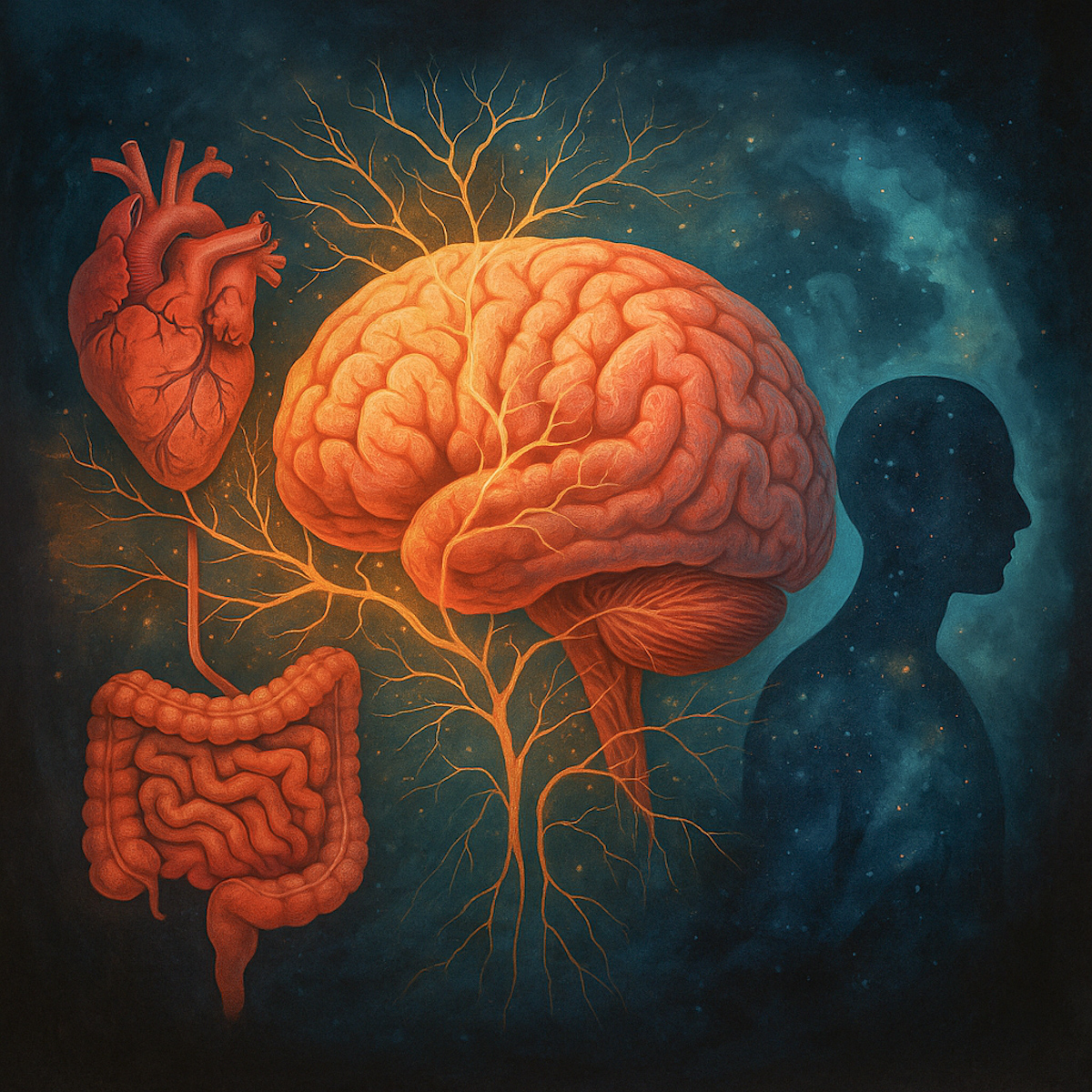Do you think your brain runs the show? — the control center where thoughts, decisions, and feelings originate? What if the story is bigger than that? What if many of the states we experience — hunger, calm, unease, even flashes of intuition — are shaped by signals flowing from the body back to the brain? Modern research is beginning to reveal just that: a constant dialogue between neurons, microbes, and sensory cells that influences how we feel and act in ways we’re only starting to understand.
Researchers at Duke University have uncovered something remarkable in this context: a genuine sixth sense. Led by Diego V. Bohórquez and colleagues, the team showed that specialized cells in the colon, called neuropods, can detect a bacterial protein known as flagellin. When they sense it, these cells send an electrical signal directly to the brain via the vagus nerve — bypassing slower hormonal and immune pathways (Bohórquez et al., Duke University School of Medicine, 2025).
The gut-to-brain signal happens on the timescale of neural activity — within seconds — rather than the slower, more indirect pathways we’ve usually associated with the gut-brain axis. In experiments, mice that sensed flagellin reduced their food intake. But those lacking the receptor TLR5 didn’t respond — they kept eating and gained weight. The implication is striking: the brain is constantly being updated by microbial signals in the gut, shaping appetite and perhaps mood and behavior along the way.
For years, we’ve heard about the “gut-brain axis,” usually framed around long-term effects of diet, inflammation, or hormones. This discovery adds a new layer: the gut doesn’t just communicate slowly over hours or days — it can send rapid, almost immediate messages.
Why does this matter? Because it changes how we think about self-regulation. Many of us try to control appetite or mood purely with willpower. But here we see that the gut, and the trillions of microbes living there, are already part of that process. They’re not just passengers. They’re participants in the decisions we think of as our own.
Science will no doubt look at ways to turn this discovery into treatments — pills, targeted probiotics, new levers of control. But perhaps the deeper lesson is different. Instead of bypassing the system, we could learn to live with it. To create lifestyles that respect the full organism: what we eat, how we rest, how we breathe, and the environments we choose. The neurobiotic sense is not just a mechanism to exploit — it’s a reminder of the body’s intelligence, and how much there is to gain by listening to it.
There’s also a more personal takeaway. If the gut is constantly in dialogue with the brain, then what we eat, how we breathe, and how we live isn’t just fuel — it’s part of an ongoing conversation shaping our inner state. For anyone exploring altered states, meditation, or breathwork, this adds another dimension: the gut isn’t separate from the search for clarity or balance. It’s part of it.
We tend to look outward for control and inward for meaning. The neurobiotic sense reminds us that those directions are not separate. They converge in the body. And when we pay attention — not just to the mind but to the whole system — we may find a more grounded path toward transformation.
And maybe science is finally catching up with what intuition and ancient wisdom have been pointing to for millennia. The vagus nerve is a two-way highway: about 80% of its fibers carry information upward from the body, while the brain sends its own instructions back down. Enteroendocrine cells in the gut can synapse directly with vagal neurons in milliseconds (Science, 2018). Experiments with probiotics have shown that behavior and brain chemistry shift through these channels — but only if the vagus nerve is intact (PNAS, 2011).
Layer today’s discovery of the neurobiotic sense on top of this and the idea of a purely “brain-based” awareness starts to feel incomplete. Our moods, intuitions, and inner states may emerge not just from neurons in the head, but from the entire network of sensory cells, organs, and microbes in dialogue with the brain.
Perhaps “gut wisdom” is not fantasy at all. It may be the lived reality of a body whose intelligence is distributed, whose awareness is shaped by signals flowing both ways. The science is young, but the direction is clear: what we call state of being may not sit in the brain alone. It may be a whole-body phenomenon.
It also makes me wonder: how many other kinds of cells are sending information back and forth between our gut and brain — signals we haven’t even begun to discover?
References
- Bohórquez, D. V., Kaelberer, M. M., et al. (2025). Newly Discovered Sixth Sense Links Gut Microbes to Brain in Real Time. Duke University School of Medicine. Link
- Kaelberer, M. M., Buchanan, K. L., et al. (2018). A gut-brain neural circuit for nutrient sensory transduction. Science, 361(6408), eaat5236.
- Bravo, J. A., Forsythe, P., et al. (2011). Ingestion of Lactobacillus strain regulates emotional behavior and central GABA receptor expression in a mouse via the vagus nerve. PNAS, 108(38), 16050–16055.
- Berthoud, H. R., & Neuhuber, W. L. (2000). Functional and chemical anatomy of the afferent vagal system. Autonomic Neuroscience, 85(1–3), 1–17.
- Sternson, S. M., & Atasoy, D. (2014). Neural circuits governing hunger and eating behaviors. Cell Metabolism, 19(5), 725–741.
Disclaimer: I do the research, first draft and final editing myself and I use ChatGPT throughout the whole process




